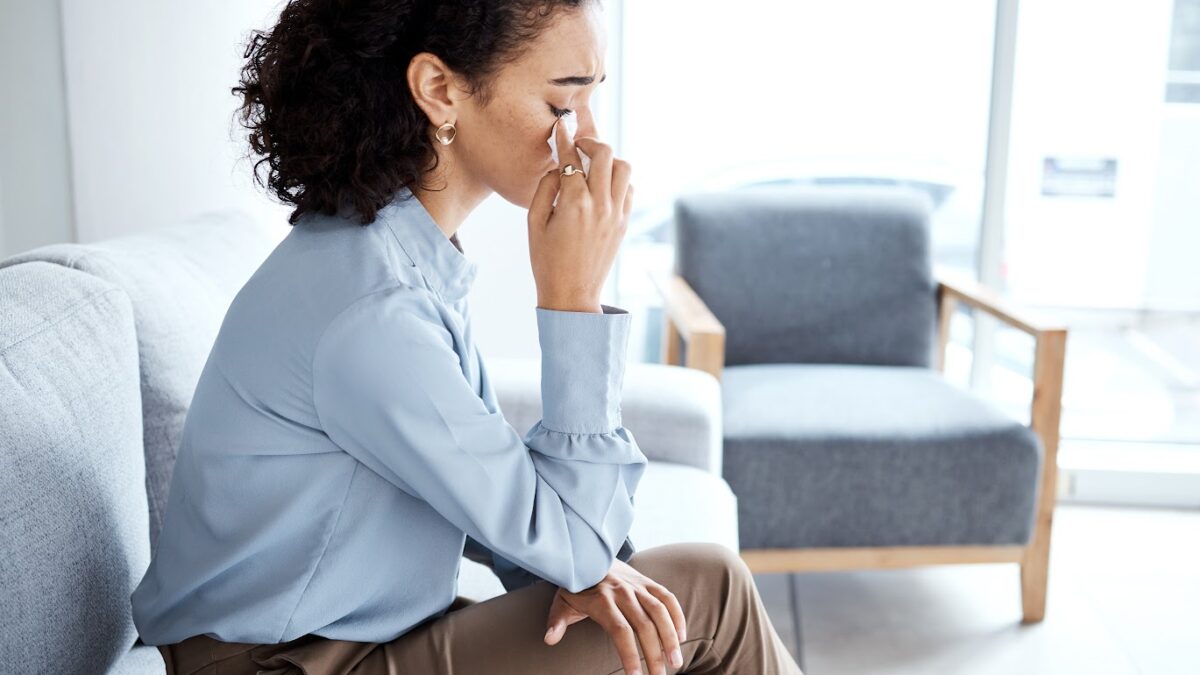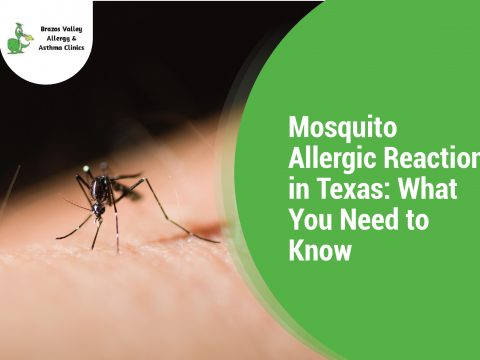- 979-485-9287
- office@bvallergy.com
-
 979-251-7804
979-251-7804
Allergy Anxiety: How It Affects Quality of Life

Allergy Season in Texas 2024: Everything You Need to Know
February 27, 2024
Oak Season Blues: Are Your Allergy Meds up to the Task?
April 2, 2024Do seasonal allergies make you feel more than a little sniffly and sneezy? Have you ever wondered if there’s a deeper connection between your allergies and that creeping feeling of anxiety? You’re not alone. When the weather in Texas can be as unpredictable as its wildflowers, allergy anxiety is a genuine and often overlooked concern.
For many, the lines between allergies and anxiety often blur, leading to even more anxious feelings. These two distinct conditions share a link, making it even more important to understand how they can work in tandem. In this blog, we’ll share valuable insights into the interplay of allergies and anxiety, helping you develop an informed and targeted approach to effectively manage your condition.
The Allergy-Anxiety Connection
Food allergies are on the rise, now affecting approximately 4% of children and adolescents across the United States. Beyond physical health, studies reveal that these allergies profoundly impact various aspects of quality of life, encompassing both physical and emotional well-being.
Navigating through the pollen-laden air of Texas, it’s hard not to feel the weight of seasonal allergies bearing down on you. But what if these allergies aren’t just causing physical discomfort? What if they’re also triggering anxiety? Let’s take a closer look at how this connection develops, uncovering the interplay between anxiety and allergic reactions.
-
Physiological Response
When an allergic reaction occurs, the body’s immune system kicks into high gear, releasing histamines and other chemicals to combat foreign threats. This leads to allergy symptoms, such as itching, sneezing, and swelling. This physiological response, while usually mild, can trigger feelings of anxiety and distress.
-
Psychological Impact
Having allergy anxiety means constantly worrying about your food or the potential allergens you encounter. Besides the physical discomfort, dealing with itchy eyes and constant sneezing can also take a toll on your mental well-being. This persistent concern is a constant source of stress, resulting in an ongoing mental burden that compromises your overall quality of life.
-
The Cycle of Anxiety
As anxiety sets in, it can exacerbate allergy symptoms, creating a vicious cycle of physical discomfort and psychological distress. Breaking this cycle can be especially difficult and may seriously impact one’s well-being.
Unraveling the Link Between Stress and Allergies

In the hustle and bustle of Texan life, stress is unavoidable. And stress can exacerbate allergy symptoms and contribute to allergy-related anxiety. Let’s uncover the complex link between stress and allergies:
-
Immune Response
When under stress, the body produces cortisol, a hormone associated with the fight-or-flight response. Prolonged stress can suppress the immune system, making it more susceptible to allergic reactions.
-
Inflammatory Pathways
Stress can also trigger inflammatory pathways in the body, further aggravating allergy symptoms. The heightened inflammation can lead to increased histamine production, worsening symptoms like nasal congestion and itching.
-
Psychological Burden
Beyond its physiological effects, stress can impact mental health, increasing feelings of anxiety and exacerbating existing allergy-related distress. The constant battle between stress and allergies can leave individuals feeling overwhelmed and drained.
-
Sleep Disruptions
Allergy anxiety often contributes to difficulty in falling or staying asleep. Persistent symptoms like nasal congestion, itching, and discomfort can disrupt sleep patterns, leading to fatigue and further exacerbating stress.
Read More: Sleep and Allergies: How to Cope for a Better Night’s Sleep
-
Impaired Concentration
Dealing with the constant physical discomfort of allergies and the added layer of anxiety can make it challenging to concentrate on daily tasks. This may impair cognitive function, affecting productivity at work or in personal activities.
-
Social Impact
Allergy anxiety can have a profound effect on social interactions. Individuals may avoid outdoor activities or social gatherings to minimize exposure to allergens, leading to feelings of isolation and potentially impacting relationships.
-
Reduced Quality of Life
The cumulative impact of allergy anxiety on sleep, concentration, and social life can significantly diminish overall quality of life. The constant struggle to manage symptoms can overshadow the enjoyment of everyday activities.
-
Impact on Physical Health
Beyond the immediate allergy symptoms, chronic stress and anxiety can contribute to long-term health issues, including cardiovascular problems, digestive disorders, and a weakened immune system.
-
Financial Strain
Frequent visits to allergy experts, purchasing medications, and missed work due to allergy-related issues can financially strain individuals managing allergy anxiety. Beyond causing physical and mental burdens, allergy anxiety introduces significant economic challenges for those grappling with the condition.
Strategies for Managing Allergy Anxiety
Living with allergy or anxiety in Texas doesn’t have to mean resigning yourself to a life of discomfort and distress. There are practical steps you can take to manage symptoms and, ultimately, reclaim control over your well-being.
-
Identify Triggers
Identifying what causes your allergies is the initial step in effectively managing your condition. Keep a journal to track symptoms and potential triggers, whether it’s pollen, dust, or pet dander.
2. Practice Stress Management
Integrate stress-relieving practices into your everyday schedule, like mindfulness meditation, deep breathing exercises, or yoga. These practices can help calm the mind and alleviate anxiety.
3. Seek Support
Don’t hesitate to reach out to friends, family, or allergy experts for support. Talking about your struggles with allergy anxiety can provide relief and help you feel less isolated in your experience.
Read More: Your Guide to Selecting the Best Texas Allergy Specialist
Navigating Allergy Anxiety for a Better Quality of Life
In Texas, where allergies and anxiety can intersect in confusing ways, it’s crucial to understand their relationship. By seeing the link between allergies, stress, and anxiety, you can empower yourself to take proactive steps toward better health and well-being. So, the next time you observe the pollen count rising and anxiety creeping in, remember that you now have the tools to reclaim control over your quality of life.
Feeling overwhelmed by allergy anxiety in Texas? If you’ve been searching “Texas allergy center” or “strategies for stress and allergies,” you’re in the right place! Take the first step toward being free from the health impact of allergy anxiety. Choose Brazos Valley Allergy & Asthma Clinics. Contact us at 979-485-9287 or click the “Book an Appointment” to kickstart your journey with expert guidance, proven solutions, and high-quality care.




